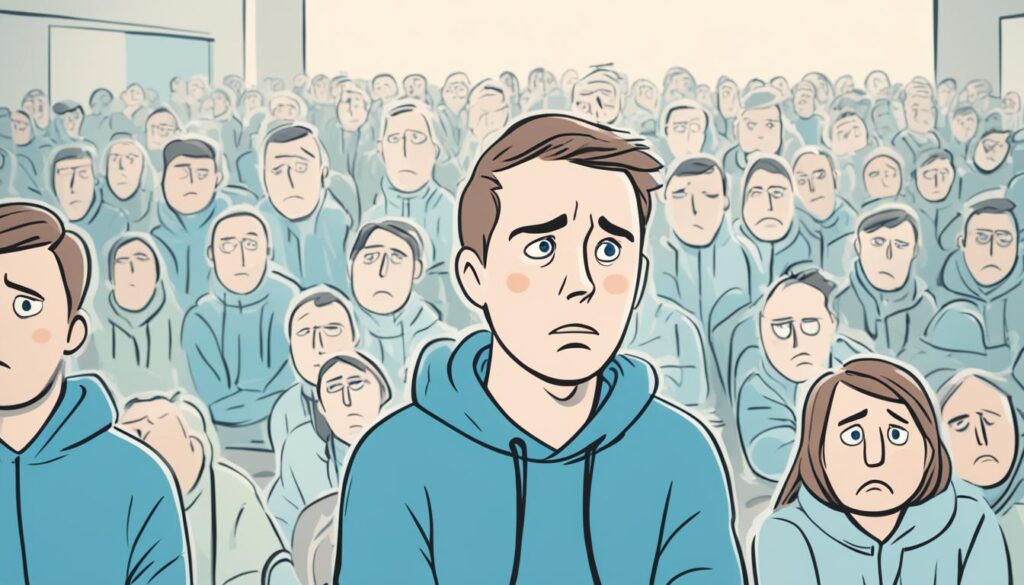We’re all becoming more aware of how important mental health is, especially for young adults. Around the world, one in seven teens, aged 10 to 19, deals with a mental disorder. This makes up 13% of all diseases in this age group. Depression, anxiety, and behavioral issues are top causes of illness and disability in teens. Sadly, suicide is the fourth leading cause of death for those aged 15 to 29.
It’s vital to protect our teens from tough times, teach them about feelings, and make sure they can get mental health care. We need to focus on the mental health issues young adults face and find ways to help them stay well.
Table of Contents
ToggleIntroduction to Mental Health Challenges in Young Adulthood
Young adults face unique mental health challenges as they move into adulthood. This stage, from ages 16 to 24, brings big changes in physical, emotional, and social areas. These changes make young people more likely to struggle with mental health issues.
Most young adults feel happy with their health, but many still deal with mental health problems. About one in five feel symptoms of depression or anxiety.
Unique Developmental Period of Transition
Transitioning to adulthood is a time of growth and learning. Young adults make big decisions, like going to college, starting careers, and forming close relationships. This time can be both thrilling and stressful, which might lead to mental health issues.
High Prevalence of Mental Health Conditions
Mental health problems often start in the teens and early twenties. Conditions like anxiety, depression, and eating disorders are common in young adults. It’s important to understand these issues to help support and treat them effectively.

Mental Health Determinants and Risk Factors
Keeping good mental health is hard because many things can affect it. For young adults, knowing what affects their mental health is key. We’ll look at how things around them and tough life events can change their mental health.
Socio-Environmental Influences
Where young adults live and who they are around shapes their mental health. Being in a supportive family, having good friends, and feeling part of a community helps them stay strong. But, facing economic problems, violence, or tough parenting can make them more likely to have mental health issues.
Adverse Life Experiences and Trauma
Going through hard times can deeply affect mental health. Young adults who’ve been through abuse, lost someone close, or faced a disaster might struggle more with mental health. These experiences can lead to anxiety, depression, and post-traumatic stress disorder.
Some groups, like those in crisis areas or with ongoing illnesses, face extra challenges. They might find it harder to stay mentally healthy. It’s vital to help these groups to improve their mental well-being.

Common Mental Health Issues in Young Adults
Young adults often face mental health challenges during their transition to adulthood. Anxiety and depressive disorders are among the most common issues. These can greatly affect their well-being and daily life.
Anxiety and Depressive Disorders
Anxiety disorders are the top mental health issues for young adults. About 3.6% of 10-14-year-olds and 4.6% of 15-19-year-olds deal with anxiety. This can take many forms, like generalized anxiety, social anxiety, or panic disorders.
These conditions can make it hard for young people to go to school, be social, and keep up healthy relationships.
Depressive disorders are also a big worry for young adults. Around 1.1% of 10-14-year-olds and 2.8% of 15-19-year-olds have depression. Depression can lead to social withdrawal, school problems, and a higher risk of suicidal thoughts or actions.
It’s important to address these mental health issues in young adults. Doing so helps them stay well and succeed in life.

Knowing how common anxiety and depressive disorders are in young adults is key. It helps us provide the right support and resources. By tackling these issues, we can help them become more resilient. This leads to better academic and social lives and overall well-being.
Behavioral and Eating Disorders
Young adulthood brings many mental health challenges, like behavioral and eating disorders. These issues can affect our lives a lot, from school to personal relationships. Let’s look at the common disorders young adults face today.
Attention Deficit Hyperactivity Disorder (ADHD)
ADHD makes it hard to focus, be too active, and act on impulse. It’s more common in teens, with about 3.1% of 10-14-year-olds having it. By 15-19, this drops to 2.4%. ADHD can make school hard and increase the chance of getting into trouble with the law if not managed.
Conduct Disorders and Challenging Behaviors
Conduct disorders involve constant disruptive and aggressive actions. They’re more common in 10-14-year-olds, affecting 3.6%. By 15-19, this drops to 2.4%. These issues can hurt a young person’s school life and might lead to legal problems if not dealt with quickly.
Young adults also face eating disorders like anorexia and bulimia. These can badly affect both physical and mental health. They often start in adolescence and young adulthood.
It’s key to tackle these mental health issues in young adults to support their well-being. Early help and the right support can help them get through this tough time. With the right approach, young adults can beat these challenges and do well.
Psychosis and Emerging Mental Illnesses
Young adults often face mental health issues like psychosis as they enter adulthood. Symptoms such as hallucinations or delusions can make daily life hard. It’s key to spot and help these issues early to support their well-being.
Psychosis and mental health problems often start in late teens or early twenties. This is a big change time for young people, physically, mentally, and socially. For those with psychosis or other mental illnesses, it can be tough.
The stigma around mental health can lead to rights violations and more isolation for young people. We need to work on understanding, empathy, and getting them the right mental health care.
Recognizing and Addressing Emerging Mental Illnesses
Spotting and helping psychosis and other mental health issues early can change a young adult’s future. By knowing the signs and getting them help fast, we can help them cope and stay well.
- Talk to young adults and their families about psychosis and other mental health signs
- Push for regular mental health checks to catch problems early
- Make sure they know about therapy and medication options
- Create places that support them and reduce stigma
Putting mental health first for young adults helps them navigate adulthood better. It lets them reach their goals and live their best lives.
Suicide, Self-Harm, and Risk-Taking Behaviors
Suicide is a major concern for young adults, with this group facing the fourth highest suicide rate worldwide. Factors like harmful alcohol use, childhood abuse, and easy access to dangerous means can lead to this trend. Young adults also often take risks with substances and unsafe sex, which can harm their health.
Suicide: A Leading Cause of Death
Suicide is a top cause of death for young people aged 15-29. Mental health issues, feeling lonely, and not having support can make someone more likely to think about or attempt suicide. We need to tackle this with a wide-ranging approach that looks at the deep causes and offers caring, easy-to-get help.
Substance Use and Risky Sexual Behaviors
Young adults often use substances and engage in risky sex, which can harm their health. These actions increase the chance of getting STDs, unplanned pregnancies, and long-term addiction. It’s vital to start early and teach them well to make smart choices and find healthy ways to cope.
Dealing with suicide, self-harm, and risky behaviors in young adults needs a full, science-backed plan. We must look at the main causes, reduce the stigma around mental health, and make support services easier to get. This way, we can help young people get through this tough time strong and healthy.
Mental Health Promotion and Early Intervention
Promoting mental health in young adults needs a wide approach. It’s about making coping skills stronger, improving support, and getting better mental health services. By building resilience and teaching healthy ways to cope, we help young adults take care of their mental health.
Building Resilience and Coping Skills
Programs that focus on building resilience give young adults the tools to handle life’s ups and downs. They teach stress management, emotional smarts, and self-care. This way, young adults learn to deal with stress and stay mentally healthy.
Improving Access to Mental Health Services
It’s key that young adults can easily find mental health services made for them. This means more mental health help in schools, hospitals, and community groups. By making services easy to get and fit for young adults, we encourage them to get help when they need it.
This approach helps prevent mental health issues and offers early help to young adults. By giving them the right skills and support, we help them build a strong mental foundation. This way, they can do well in this important part of their lives.
Addressing Unique Needs and Challenges
Young adults face big challenges in mental health. It’s key to understand their special needs and tackle their unique problems. They’re in a big change, moving towards independence and dealing with the results of their choices.
Integrating Mental Health into Overall Care
It’s vital to blend mental health into the full care of young adults. This means looking at issues like not taking medicine as told and how physical health affects mental well-being. A complete approach helps stop mental health from getting worse and supports long-term health.
Getting families and caregivers involved is also key. They know the complex world of the young adult’s life. This helps us make care plans that really fit their mental health needs.
Putting mental health first in caring for young adults helps them through this big life change. This way, they get the support and tools they need. It tackles the young adult mental health needs and young adult mental health challenges. It leads to better outcomes and integrated care young adults should get.
Conclusion
The mental health of young adults in the U.S. is a big concern. We need to pay attention and take action. By understanding their challenges and needs, we can help them thrive.
It’s important to tackle the factors that affect their mental health. We should promote resilience and healthy ways to cope. Also, making sure they have access to the right mental health services is key.
By taking these steps, we can help young people live fulfilling lives. They can make a positive impact in our communities. Let’s keep focusing on supporting their mental health.
Together, we can build a society that values mental health. We can reduce stigma and give everyone a chance to succeed. Let’s do it.
FAQ
What are the key mental health challenges faced by young adults?
Young adults, ages 16-24, go through big changes in their lives. These changes can make them more likely to face mental health issues. Conditions like anxiety, depression, and eating disorders are common during this time.
What factors can impact the mental health of young adults?
Many things can affect young adults’ mental health. This includes having a supportive environment and facing challenges like poverty and violence. Harsh parenting and past traumas also play a role.
What are some of the common mental health issues among young adults?
Anxiety, depression, ADHD, and eating disorders are common among young adults. Conditions like psychosis also affect many in this age group.
How does suicide and risk-taking behavior impact young adults?
Suicide is a major concern for young adults. Factors like substance use and feeling alone can increase the risk. They also engage in risky behaviors, which can harm their mental and physical health.
What strategies are important for promoting mental health and preventing mental health conditions in young adults?
Improving mental health in young adults requires a comprehensive approach. It should focus on building coping skills and providing support. Early intervention for mental health issues is also key.
How can we address the unique needs and challenges of young adults in relation to their mental health?
Working with families and addressing issues like not taking medication are important. Integrating mental health care into overall health care is also crucial for young adults.
Source Links
- https://www.who.int/news-room/fact-sheets/detail/adolescent-mental-health – Mental health of adolescents
- https://www.ncbi.nlm.nih.gov/pmc/articles/PMC4953734/ – Mental health in young adults and adolescents – supporting general physicians to provide holistic care
- https://www.samhsa.gov/young-adults – Mental Illness and Substance Use in Young Adults
About The Author

This article is medically reviewed by Dr. Chandril Chugh, Board-Certified Neurologist, providing expert insights and reliable health information.
Dr. Chandril Chugh is a U.S.-trained neurologist with over a decade of experience. Known for his compassionate care, he specializes in treating neurological conditions such as migraines, epilepsy, and Parkinson’s disease. Dr. Chugh is highly regarded for his patient-centered approach and dedication to providing personalized care.
→ Book a consultation to discover which remedies suit your needs best.




